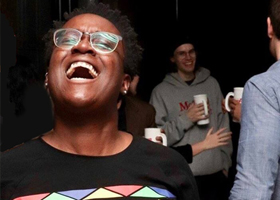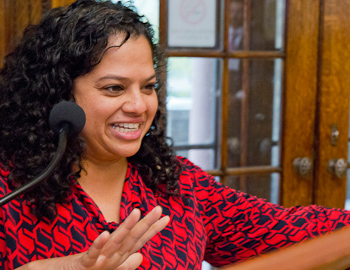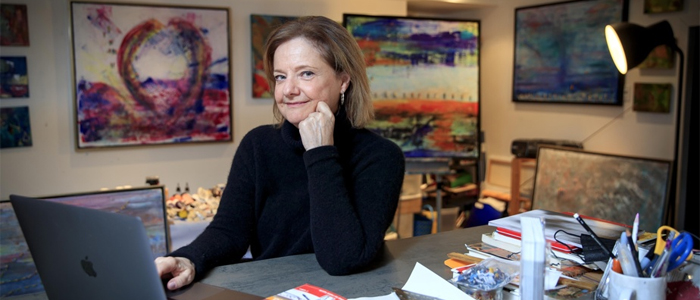
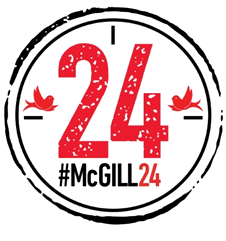 After a hugely successful McGill24 campaign this year, we wish to thank the 274 donors who helped raise almost $420,000 in donations to the Faculty of Law. After a hugely successful McGill24 campaign this year, we wish to thank the 274 donors who helped raise almost $420,000 in donations to the Faculty of Law.
Vos dons iront loin, alors que nous envisageons le troisième siècle de McGill et l’avenir de la formation juridique avec optimisme. Merci infiniment! |
|
Tanya de Mello is Bullard Award Recipient 2021
Dr. Tanya (Toni) de Mello, BCL/LLB’11, has received the Edward P. Bullard Distinguished Alumnus Award from the Princeton School of Public and International Affairs. Currently, Toni is the Assistant Dean of Students at Canada’s newest law school, the Lincoln Alexander School of Law at Ryerson University. In Toni’s role as Assistant Dean of Students, she is responsible for Admissions, Careers and Student Experience and is leading the law school’s charge to create lawyers that work for the public interest and are committed to increasing access to justice.
Consultations de deux ex-juges pour une future commission sur les erreurs judiciaires
L’actualité, 31 mars 2021
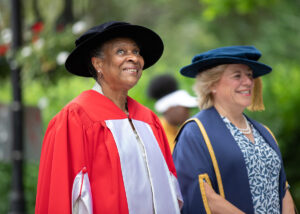
Le gouvernement libéral a nommé deux anciens juges pour mener des consultations sur la création éventuelle d’une commission indépendante qui se pencherait sur des cas présumés d’erreurs judiciaires.
Harry LaForme, ancien juge de la Cour d’appel de l’Ontario, et Juanita Westmoreland-Traoré, LLD’18, ex-juge de la Cour du Québec, mèneront des consultations sur la structure et le mandat que devrait revêtir cette nouvelle commission fédérale. Lire l’annonce.
Éloge Butera returns to Hill to work for Minister Anand
Laura Ryckewaert, Hill Times, 31 March 2021
Éloge Butera, BCL/LLB’12, has joined federal Minister of Public Services and Procurement Anita Anand’s office as a senior policy advisor, marking his return to the Hill after more than a year away, during which he was director of the African Centre of Excellence for the Dallaire Institute for Children, Peace, and Security, which is part of Dalhousie University. Previously, Butera had worked for then-public safety and emergency preparedness minister Ralph Goodale (2016-2019) as a policy adviser and liaison to the minister’s parliamentary secretary. Read the article.
Josée Noiseux à la tête du CA de la Société du Palais des congrès
Société du Palais des congrès de Montréal, communiqués, 26 mars 2021
La Société du Palais des congrès de Montréal a nommé Josée Noiseux, BCL’89, à la tête de son conseil d’administration pour un mandat de cinq ans, faisant de cette dernière la première femme à la tête du CA du Palais des congrès. Cumulant plus de 25 ans d’expérience à titre d’associée au sein du cabinet international Norton Rose Fulbright, Josée Noiseux a été PDG de la Fondation de l’Institut de cardiologie de Montréal et de NewCities, une organisation internationale basée à Montréal qui a pour objectif de contribuer par la recherche et l’innovation au développement de villes intelligentes.
L’ex-juge Suzanne Coupal écrivaine publique
Éric Clément, La Presse, 23 mars 2021
L’ex-juge à la Cour du Québec Suzanne Coupal, BCL’75, exerce, depuis le 7 avril, la fonction d’écrivaine publique à Montréal. Un projet pilote de trois mois – organisé par l’arrondissement du Plateau-Mont-Royal – l’amènera à aider des personnes ayant des besoins précis en communication écrite. Très populaire en France et en Belgique, la fonction d’écrivain public consiste à fournir aux personnes qui maîtrisent mal l’écriture une aide gratuite si elles ont, par exemple, besoin de remplir des formulaires administratifs, d’écrire des lettres ou de se doter d’un curriculum vitæ. Lire l’article.
Deloitte welcomes Sarah Qadeer as chief legal officer
Lucy Saddleton, Canadian Lawyer, 10 December 2020
Sarah Qadeer, BCL’96, has joined Deloitte as chief legal officer, partner, and a member of the executive team, in November 2021. Qadeer brings more than 22 years of legal experience to the role – most recently as general counsel at The Home Depot of Canada Inc, where in addition to legal oversight, she helped to shape strategy and operational excellence as part of the company’s executive team. Prior to her tenure at Home Depot, Qadeer practiced mergers and acquisitions at a national law firm and was a corporate securities lawyer at an investment bank. Read the article.
New alumni publications
You Can’t Take It With You
Episode 1: Estates and Trusts, 12 April 2021
In KPMG Canada’s You Can’t Take It with You podcast , Senior Associate Andrew H. Higdon, BCL/LLB’15, Senior Associate discuss what to expect from estate planners and what information should be brought to the estate planning lawyer’s attention at the start of a planning journey. Have a listen!
Beyond state visions of democracy: envisioning family and workplace as democratic spheres
Alexander Agnello, BCL/JD’19, CHRLP Blog, 8 April 2021
The 2020 US presidential election was an impressive display of democratic participation in at least one narrow sense. It saw a record voter turnout and record-breaking cash from small donors, in no small part due to the American public’s high engagement in canvassing and campaigning to match the high stakes involved. But participatory democracy isn’t only about participating in state elections. It’s also about broadening the scope of democracy to include other spheres of life. The pandemic also drew increased attention to the objectionable working conditions of many low-wage and gig economy workers across North America. Keep reading…
The case of Wrangle v Brunt – Court of Appeal overturns will forgery decision
Nicholas Choinière, BCL/LLB’14, give his take on an infamous UK case involving death, a will, and a cat.
“The Court of Appeal has ordered the re-trial of a controversial case involving a will discovered by a cat ten years after the testator’s death. The ruling provides guidance on how to approach forgery allegations and reaffirms the importance of expert evidence.” Keep reading.
Weak Privacy, Weak Procurement: The State of Facial Recognition in Canada

Yuan Stevens, BCL/LLB’18, and Ana Brandusescu, Centre for Media Technology and Democracy, Facial Recognition Governance Research Reports, 6 April 2021
“First they had our fingerprints. Now they have our faces. The case of Clearview AI reveals long-standing gaps and weaknesses in Canadian privacy law, and opaque selection practices when it comes to FRT. Tech companies and law enforcement are taking advantage of weak legal requirements in Canada to increase capital and power through the pretext of public safety. Law enforcement may serve and protect, but they also surveil, control, and conceal. Eventually they could have our voices, gait, veins, heartbeats, signatures and more… The failure to acknowledge biometric information in privacy law and a lack of transparency for government contracts allows for exploitation of these gaps in Canadian policy. But it is Canada’s marginalized communities who will most acutely experience the harm arising from this exploitation and who deserve protection, transparency, and accountability.” Read the article.
Towards a legal toolkit for disaster resilience and transformation
Disasters, Volume 45, Issue 2, April 2021
Law is acknowledged as playing an important role in the growing field of disaster resilience, writes David Matyas, BCL/LLB’19. Still, a detailed inquiry into the possible relationships between law and disaster resilience remains largely absent from the discourse. In his paper, Matyas explores how legal thinking, approaches, and instruments can act as ‘tools’ in altering the nature and conditions of disaster risks. He looks at how state institutions can wield them and non‐state actors employ them to participate in processes of change. Moving beyond a resilience literature that has tended to focus on law in terms of statutes, regulations, and human rights, he also examines the ways in which legal reasoning, procedure, and substantive law can be instrumentalised to resist shocks, provoke incremental adjustments, or even foment transformational shifts. Read his paper.
Space Regulation in Canada: Past, Present and Potential: The Case for a Comprehensive Canadian Space Law
Aram Kerkonian, LLM’18, DCL’20. Springer, 2011
Space is no longer the domain of national space agencies. Today, a significant majority of space activities are carried out by non-governmental entities, resulting in the accelerated evolution of space technologies and their applications. This operational shift from public to private does not mean, however, that governments are no longer relevant in this era of New Space. Kerkonian’s book recommends that Canada enact a comprehensive national space law and provides an annotated draft law for this purpose. By doing so, the book intends to spark a meaningful conversation on how Canada ought to fulfil its regulatory responsibilities, a topic previously unaddressed in public and academic discourse. See a preview.
International Law and Global Governance: Treaty Regimes and Sustainable Development Goals Implementation
Alexandra Harrington, DCL’15. Routledge, March 2021
Dr Harrington’s book explores the methods through which international law and its associated innovative global governance mechanisms can strengthen, foster and scale up the impacts of treaty regimes and international law on the ability to implement global governance mechanisms. See the book.

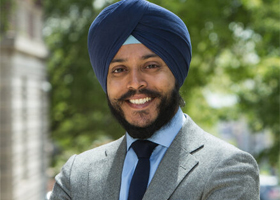 From Bay Street to Human Rights Law
From Bay Street to Human Rights Law